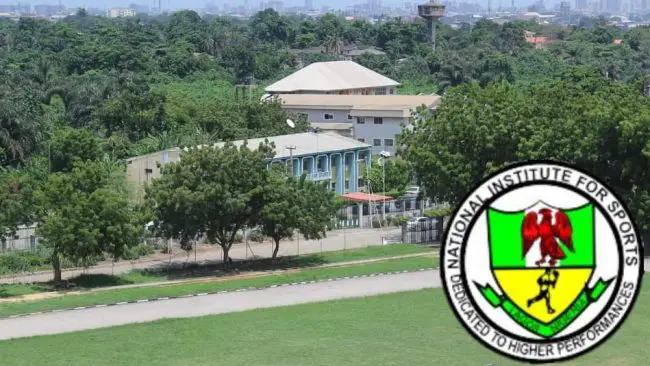I am delving into history.
The past has always been my compass into the future on the issue of the National Institute for Sports, NIS. This is because the past was glorious.
I was a part of that past. I was present at its birth in 1974.
I was a ‘fresher’ in the camp of the national football team that recruited a new set of Green Eagles from the first national sports festival in 1973.
I was one of the first set of ‘guinea pigs’ used in the experiments that were the foundation of the institute. The first set of student-coaches were drawn from the staff of the National Sports Commission that supervised the work of the institute, as well as some State Sports Councils.
The NIS opened its doors to Nigerian sports and sports development with great expectations.
Also Read: $10,000 US Dollars A Month For Secretary! –Odegbami
The pioneer instructors and teachers were renowned sports experts drawn from various sports institutions around the world, with many of them coming from the German Institute of Sports in Hennef, after which the NIS was modelled with a solid working partnership.
The entire National Stadium complex, freshly constructed with every conceivable state-of-the-art facility for use during the 2nd All African games, the Ghana/Nigeria Sports Festival, and the First National Sports Festival, all following in quick succession in 1973, was the ‘laboratory’ of the NIS.
That means that at inception the institute had facilities that covered all sports located around the massive National Sports Stadium complex, Surulere, and more. There were special training fields and courts, cinder and Astro-turf running tracks, a sophisticated sports science centre, the largest and most equipped gymnasium with modern electric saunas, physiotherapy facilities, and a rich sportsbook library.
The hostels for students and athletes in national camps in various sports were the standard of 3-star hotels.
From 1974 to 1976, the NIS prepared coaches and athletes for Nigeria’s first proper ‘assault’ at the Olympic Games to take place in Montreal, Canada, in 1976.
The coaches in charge of the national teams included Archie Moore, a retired former World Light-heavyweight boxing Champion from the United States; Hogan Kid Bassey, Nigeria’s first featherweight Boxing Champion; Lee Evans, an African/American athlete, former Double Olympic Champion, World record holder in 11 different sprinting events; several Chinese and Bulgarian coaches for table tennis, and wrestling; Oliver Johnson, African/American who later discovered Hakeem Olajuwon; and so on. Football had a pool of 6 European coaches from Germany and Yugoslavia led by Heinz Marostky who was a member of FIFA Technical Directorate for many decades.
Nigerians that worked in the institute were drawn from amongst the best in Nigerian universities led by Dr. Awoture Elayae, who later headed the institute when Mr. Isaac Akioye was the Director of Sports of the National Sports Commission, a freshly minted America-trained Head of the Department of Physical and Health Education of the University of Ife.
Also Read: Kashim Shettima, Sports, And Boko Haram, An Unscripted Encounter! –Odegbami
This underlines the level and quality of teachers and coaching instructors hired to train the first set of coaches to graduate from the various short-term programmes running in the institute at the time because the fastest way to become the best athlete is to be trained by one that has been the best.One champion begets another.
By 1976, two years into the life of the NIS, the institute had produced a pool of some of the best athletes in the history of Nigerian sports at the time, in Boxing, Athletics, Swimming and Football, ready to take on the world at the Montreal Olympic Games in Canada.
I was a member of that contingent, fresh from life as an athlete at the National Institute for Sports.
Africa boycotted the Olympics and thus shattered the dreams of the athletes as well as the expectations of a country that had invested in the most sophisticated sports institute in the whole of Africa.
The NIS was working. The formula was a careful balance of the best coaches and best guinea pigs, breeding and producing the best athletes using some of the best facilities in the world. I was a witness to all of that.
I was also a witness through the rest of that decade and even till the 1990s. As an athletes’ manager until the 1996 Olympics when two of the athletes I managed won Nigeria’s first Gold and Silver medals for females in Nigeria’s history.
In short, I know the NIS at its inception and was a product of it.
Its decline started with the decline in the architecture of Nigeria’s sports. The death of the National Sports Commission which provided its oxygen, meant the death of the NIS. The NIS could not function properly because its foundation was the National Sports Commission.
When the National Sports Commission died, the National Institute for Sports died with it. Since the mid-1990s to date, the NIS has been on life-support, a shadow of itself. The institution lost everything including the objectives for which it was set up, the direction it was to go, and every single scrap of facility and equipment for training coaches and athletes that it had at inception. Apart from the physical buildings that also lost their shine, the NIS became a carcass.
Also Read: Allen Onyema – Sports And Diplomacy Hero Of The Century! –Odegbami
I was later appointed Chairman of the Governing Council of the Institute. For the 3 years that I spent, the sleeping giant refused to even stir. It has depressed into a coma.
I should have known better than to still hold on to past glory. The world had become a different place. It was impossible to go back in time and reset the buttons of the original vision of the NIS. What the institution needed was fresh thinking and new ideas to cope with a rapidly changing world in an environment that would not go back to the future.
Chief Sunday Dare, a first-class journalist that was saddled with the responsibility to run Nigerian sports with his appointment as Minister of Sports some 4 years ago, has demonstrated great commitment to the sport, determined to leave his imprint on the sand of time. He, it was, that told me to look closely at what was going on in the new NIS that he had put in place.
The new leadership actually paid me an unusual visit to my home, to sell their new agenda and to seek my support. Even after they left I was stuck on my own experiences, unproductive sentiments about putting new wine in old wineskins.
I should have taken more interest but I did not.
This week, I visited the NIS for the first time in two decades since I left as Chairman, at the invitation of the new Governing Council to be honoured by the institute.
I took a walk through the institute whilst looking for a restroom. The institution was looking different. It was clean, bright and welcoming.
Then I went into the washroom of a room in the hostel where we students used to stay. Now converted into a small office. I went into the toilet. It was clean and smelled fresh. I turned the tap in the sink. Water gushed out.
I flushed the toilet. It felt like the greatest ‘miracle’ since the parting of the Red Sea. Running water in the NIS?
Something new and different is happening to the NIS. Going back to the past for an answer to the future was not the answer. A new future has to be created.
One hour after that, I had been conferred with an exalting honour.
As I left the premises of the NIS that evening, I made up my mind I would get Professor Wale Moronkola, the new man at the helm of affairs, the Director-General, who is creating a new future fit for the 23rd Century, under a sports ministry, must share time with me and explain to Nigerians the magic he is performing.
For it is truly magical what I saw, felt and experienced in the new NIS!
Join us this morning on Eagle7 Sports Radio for that conversation.
Meanwhile, I thank the NIS for conferring on me the honour of ‘Fellow of the National Institute for Sports’, FNIS.
Dr. Olusegun Odegbami, MON, OLY, AFNIIA





